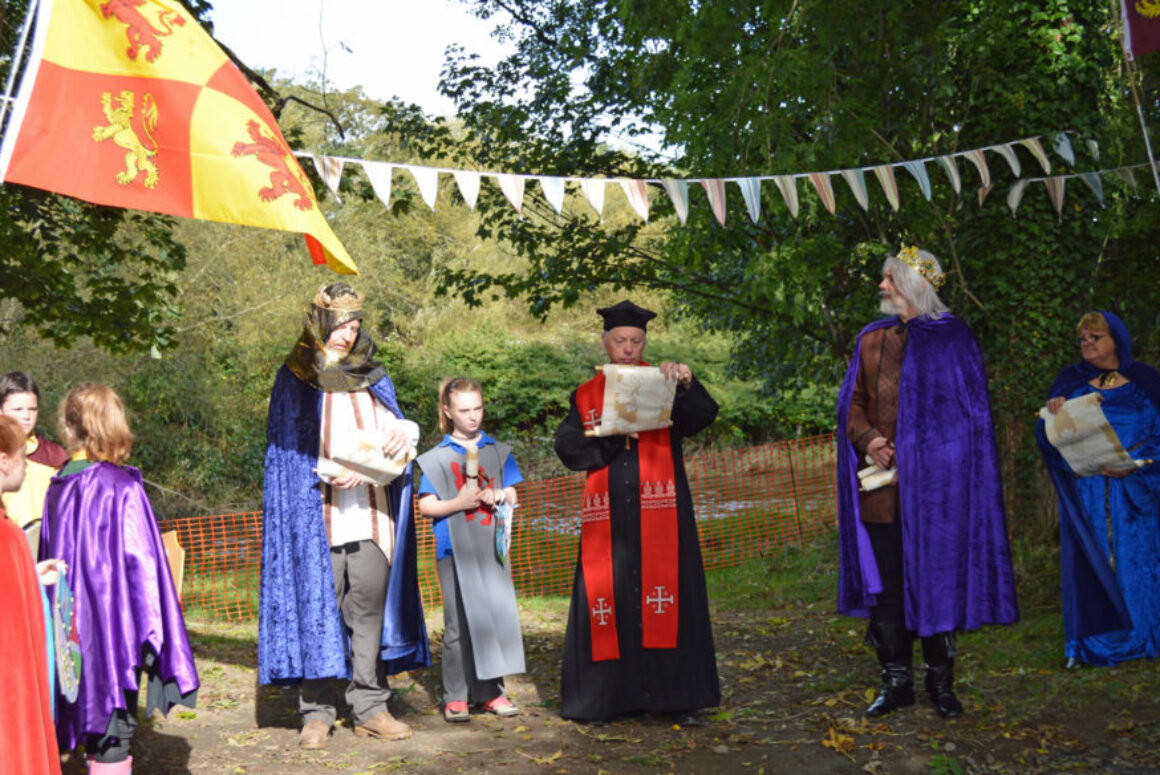Flag waving rival armies from England and Wales marched to a key crossing point on the River Severn to witness the signing of a famous Treaty 750 years ago which was later celebrated with a banquet and Monty’s celebratory brew.
The historic meeting on September 29, 1267 between King Henry III and Llywelyn ap Gruffydd, Prince of Gwynedd, at Rhydwhyman Ford, Caerhowell was the first and only time that an English ruler has recognised the right of a Welsh prince to rule over Wales. A lot of water has flowed along the Severn since that famous day, but children from Montgomery and Abermule Primary Schools and Ysgol Dafydd Llwyd, Newtown were able to bring history to life by re-enacting the signing of the Treaty of Montgomery on Friday. Adults performed roles of the main characters whilst the children filled in as the English and Welsh armies. The Queen’s official representative in Powys, Lord Lieutenant Dame Shân Legge–Bourke was also there to witness the ceremony together with Montgomeryshire MP Glyn Davies, dignitaries and local people. The re-enactment has sparked two days of celebrations in the neighbouring ancient border town of Montgomery. A Medieval Banquet and entertainment took place in the Town Hall when Montgomery’s award-winning brewery, Monty’s Brewery, commemorated the event with a celebratory brew.
On Saturday there was a medieval encampment based at Montgomery Castle. The camp allowed visitors to learn about life in the 13th century and to see clothing, food and weaponry from the period. Children had the opportunity to dress up and handle weapons safely and there was mock tournaments and skirmishes. The celebrations were organised by Montgomery Town Council and partners. One of the organisers, Councillor Cerys Thomas said:
“I think it’s important for our national history to celebrate the 750th anniversary of the signing the Treaty of Montgomery.
“It was the first and only time that an English king recognised the right of a Welsh prince to rule over Wales. It’s not the only link that King Henry III had with Montgomery, however. He came to the town when he was 16 to choose the site of the castle.”
Lord Lieutenant Dame Shân Legge–Bourke also stressed the importance of the re-enactment.
“I think it’s very important for children to learn about the history surrounding Montgomery and to enjoy it.
“I am sure that they are going to enjoy the re-enactment at Montgomery Castle tomorrow.”
Mr Davies praised Montgomery for organising a “realistic” re-enactment ceremony.
“The re-enactment helps to make young people aware of the turbulent relationship that existed between England and Wales in the past,” he said. “Montgomery has taken the historical perspective and has done a brilliant job at presenting it today.”
The Treaty of Montgomery recognised Llywelyn as the Prince of Wales, giving him territories in Wales and England. In return, he swore loyalty to Henry.
After the defeat of his ally Simon de Montfort, 6th Earl of Leicester, in 1265, Llywelyn reached agreement with Henry III at Montgomery. Many of the conditions of the treaty had been anticipated by the Treaty of Pipton in 1265 between Llywelyn and de Montfort.
The 1267 treaty gave Llywelyn Builth, Brecon and Gwerthrynion in Mid Wales and Whittington Castle, previously held by his grandfather in the 1220s. He also received an assurance that no castle would be built at Hawarden for 60 years by Robert of Mold, securing the north-eastern border of Wales.
The treaty allowed for the reinstatement of Llywelyn’s brother, Dafydd ap Gruffydd, into Welsh society after his defection to England in the early 1260s.
Though the treaty required Llywelyn to pay homage to the King of England for the land, it was an acknowledgement of the power and authority of the prince. However, following the succession of Edward I as King of England in 1272, relations between England and Wales deteriorated and Edward declared war on Llywelyn in 1276.
The Treaty of Aberconwy of 1277 superseded the Treaty of Montgomery and severely curbed Llywelyn’s power. In December 1282, 15 years after the original treaty, Llywelyn was killed in a surprise attack in Cilmeri, near Builth Wells.
For more information visit: www.montysbrewery.co.uk





